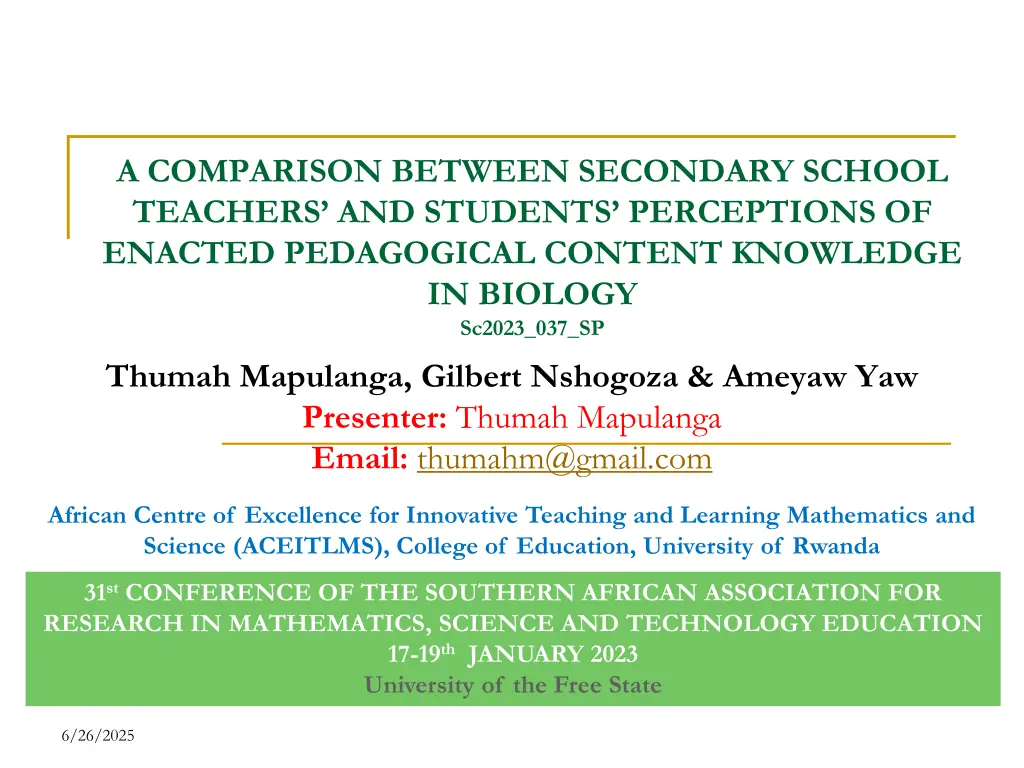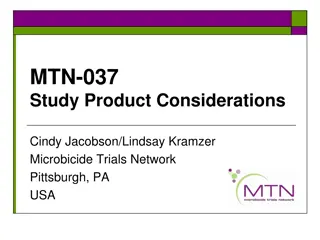
Comparison Between Teachers and Students Perceptions of Pedagogical Content Knowledge in Biology
This study examines the perceptions of secondary school teachers and students regarding enacted pedagogical content knowledge (PCK) in biology. The research investigates the quality of teachers' PCK and its influence on student learning outcomes. Various models of PCK are discussed, and the methodology involves a quantitative research approach with surveys conducted on 54 biology teachers and 319 students. The results of the study are analyzed using an independent samples t-test via SPSS.
Download Presentation

Please find below an Image/Link to download the presentation.
The content on the website is provided AS IS for your information and personal use only. It may not be sold, licensed, or shared on other websites without obtaining consent from the author. If you encounter any issues during the download, it is possible that the publisher has removed the file from their server.
You are allowed to download the files provided on this website for personal or commercial use, subject to the condition that they are used lawfully. All files are the property of their respective owners.
The content on the website is provided AS IS for your information and personal use only. It may not be sold, licensed, or shared on other websites without obtaining consent from the author.
E N D
Presentation Transcript
A COMPARISON BETWEEN SECONDARY SCHOOL TEACHERS AND STUDENTS PERCEPTIONS OF ENACTED PEDAGOGICAL CONTENT KNOWLEDGE IN BIOLOGY Sc2023_037_SP Thumah Mapulanga, Gilbert Nshogoza & Ameyaw Yaw Presenter: Thumah Mapulanga Email: thumahm@gmail.com African Centre of Excellence for Innovative Teaching and Learning Mathematics and Science (ACEITLMS), College of Education, University of Rwanda 31st CONFERENCE OF THE SOUTHERN AFRICAN ASSOCIATION FOR RESEARCH IN MATHEMATICS, SCIENCE AND TECHNOLOGY EDUCATION 17-19th JANUARY 2023 University of the Free State 6/26/2025
Background-What is PCK? Why care? PCK is the amalgam of pedagogical and content knowledge (Shulman, 1986). Allows teachers to transform content into forms that students easily comprehend It influences students learning and outcomes Therefore, examining the quality of teachers PCK is on the agenda of many educational systems (Guerreiro, 2017). Researchers have focused on understanding the nature of PCK, how it develops and influences learning 6/26/2025
Background-What is PCK? Why care? Many models describe the nature of PCK e.g. Magnuson et al (1999), Pentagon model (Park and Chen, 2012), Consensus model (Gess- Newsome, 2015), revised consensus model (Carlson et al., 2019). In this study, PCK comprised 6 components: Curricular saliency Students prior knowledge Conceptual teaching strategies What makes the subject easy or difficult Representations Assessment 1. 2. Mavhunga & Rollnick (2013) 3. 4. 5. 6. 6/26/2025
Problem & Research Question There is a paucity of data on secondary school science Zambia This study was guided by the following research question; How do secondary school teachers and students perceptions of teachers enacted PCK in biology compare? teachers' PCK in 6/26/2025
Methodology Research Approach Quantitative Research Design Survey Sampling and ethical issues 54 biology teachers (purposively) and 319 students (Simple random sampling ) Obtained research permits, and informed consent Concealed the identity of the school and participants Procedure: Questionnaires self-administered (for teachers), and researcher-administered (for students) Analysis: Independent samples t-test via SPSS 6/26/2025
Results 6/26/2025
Discussion of findings There were differences between teachers and students perceptions of ePCK in biology The teachers' perceptions were higher than the students' perceptions. Similar to Budge and Cowlishaw (2012). Teachers awareness and consideration of students perceptions may help improve their PCK (Luft et al. 2022). There is a possibility of teachers rating themselves highly in self-reported measures of PCK, therefore more data is needed to ascertain quality of PCK Students perceptions are usually accurate (Uner $ Akkus, 2019), and should inform policy on TPD However, the study used one data source, there is a need to triangulate the data to get a real measure of ePCK 6/26/2025
Conclusion and Recommendations Teachers and students perceptions were significantly different in all components Teachers perceptions were higher Enactment of WD was lowest for both teachers and students The study recommends considering students voice in TPD implementation There is a need to pay attention to teachers; knowledge of the WD 6/26/2025
Key References Budge, K., & Cowlishaw, K. (2012). Student and teacher perceptions of learning and teaching: a case study. Journal of Further and Higher Education, 36(4), 549 565. https://doi.org/10.1080/0309877X.2011.643775 Guerreiro, S. (2017). Pedagogical knowledge and the changing nature of the teaching profession. In Centre for Educational Research and Innovation. OECD (ed). OECD. http://dx.doi.org/10.1787/9789264270695-en Luft, J. A., Navy, S. L., Wong, S. S., & Hill, K. M. (2022). The first 5 years of teaching science: The beliefs, knowledge, practices, and opportunities to learn of secondary science teachers. Journal of Research in Science Teaching, 1 34. https://doi.org/10.1002/tea.21771 Mavhunga, E., & Rollnick, M. (2013). Improving PCK of chemical equilibrium in pre-service teachers. African Journal of Research in Mathematics, Science and Technology Education, 17(1 2). 113 125.https://doi.org/10.1080/10288457.2013.828406 Uner, S., & Akkus, H. (2019). Secondary students perceptions of their teachers pedagogical content knowledge: a scale development study. Teacher Development, 23(5), 566 587. https://doi.org/10.1080/13664530.2019.1674685 6/26/2025
Thank you!! I now welcome your questions and comments 6/26/2025

